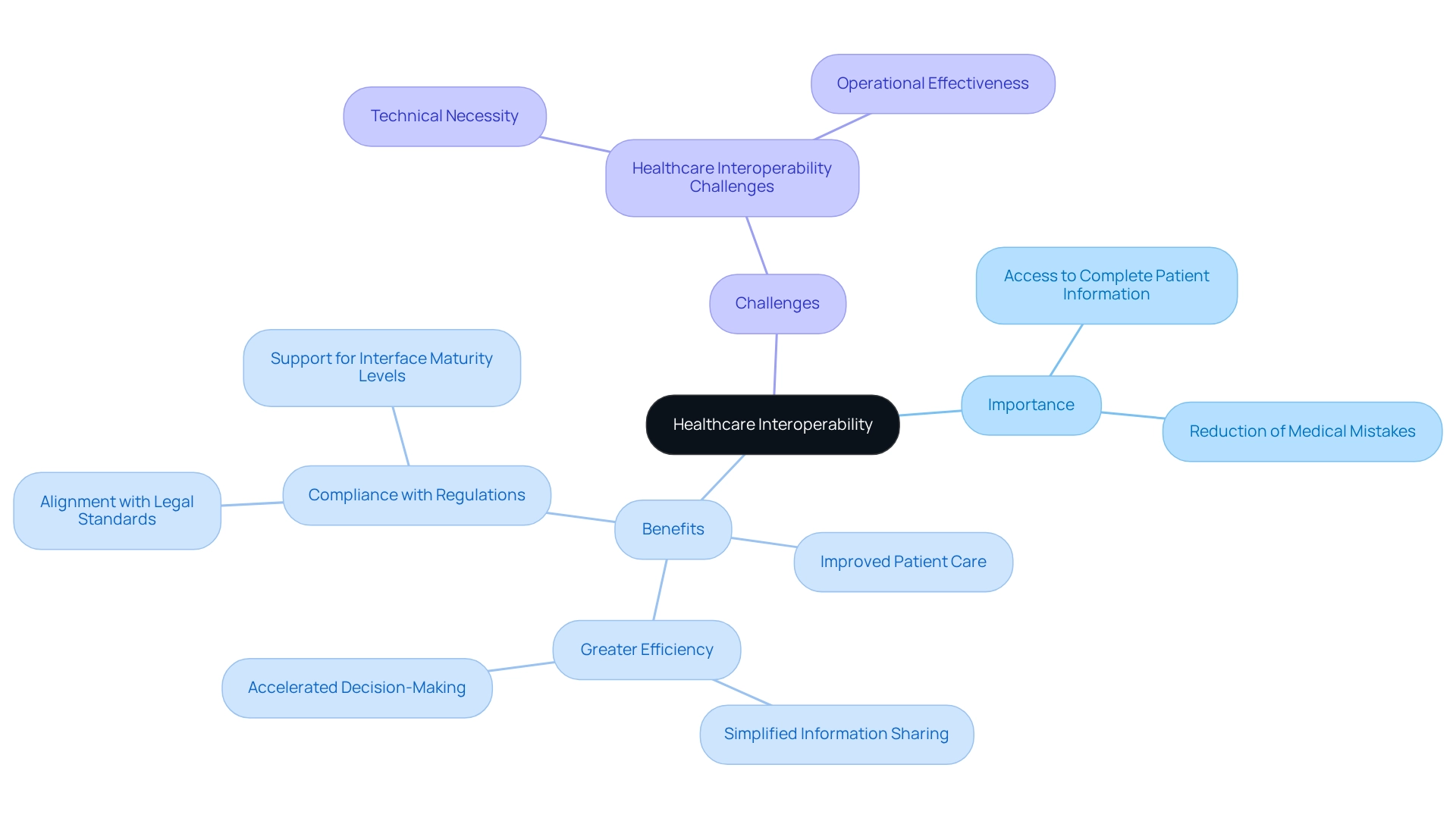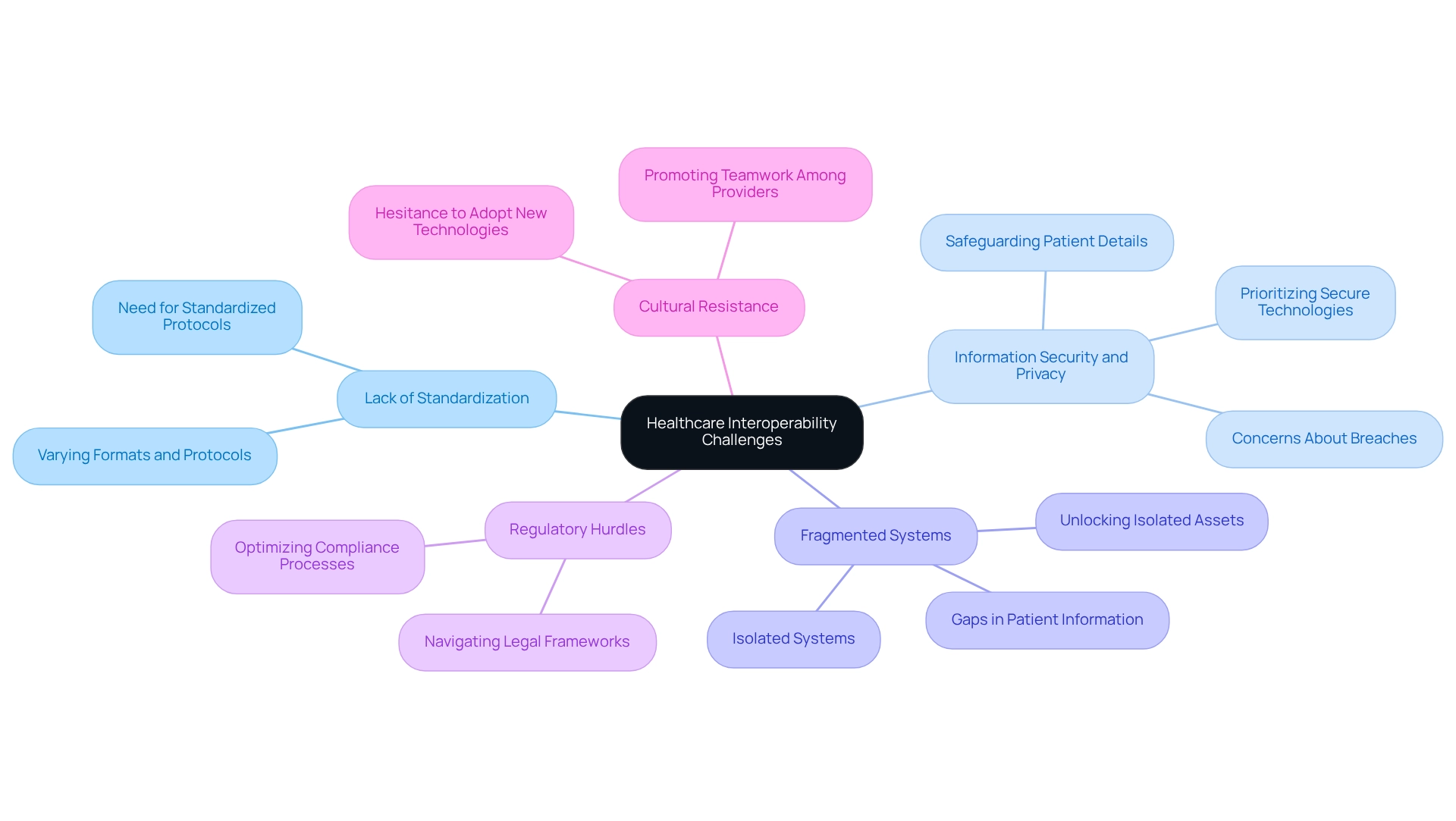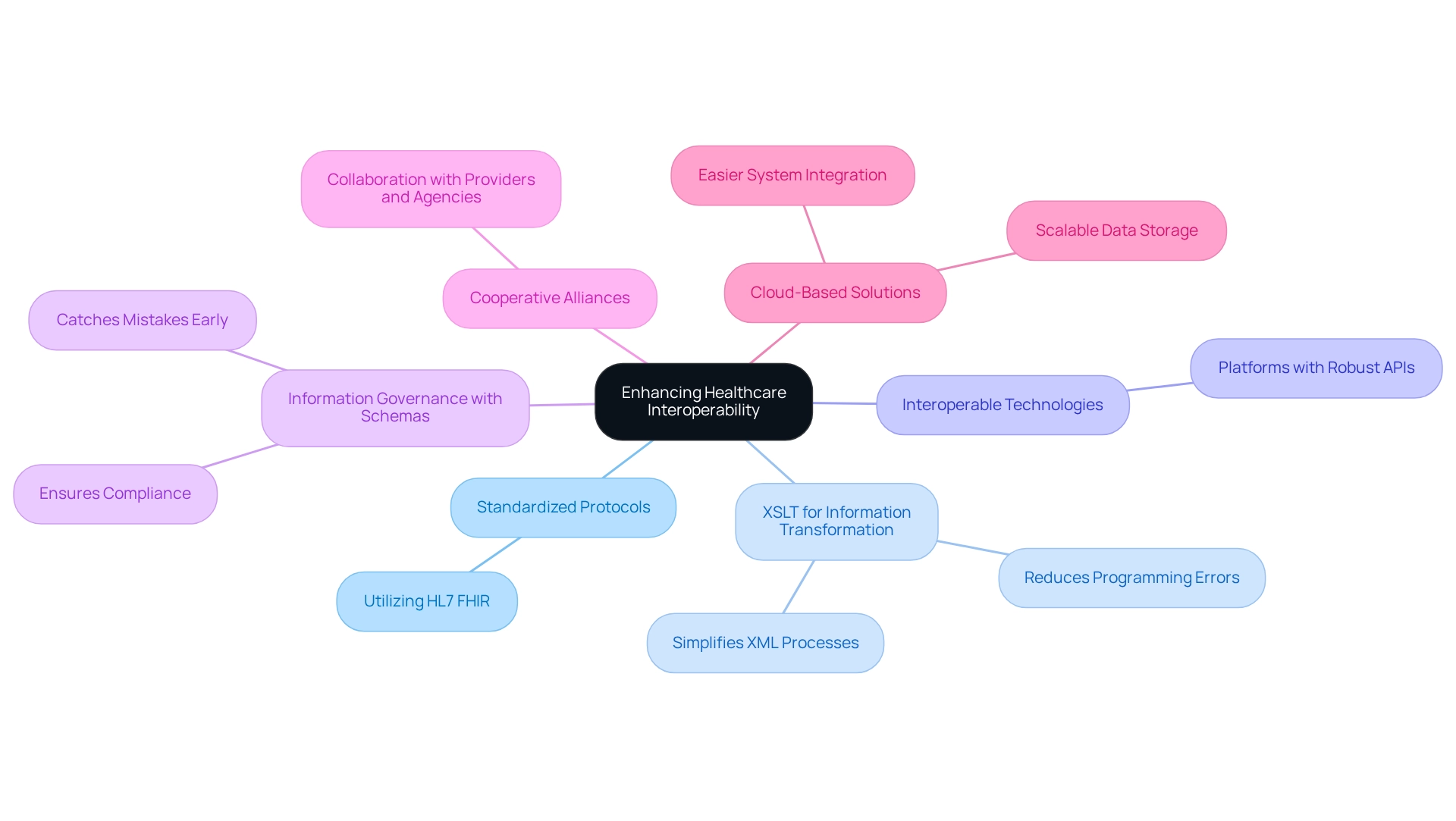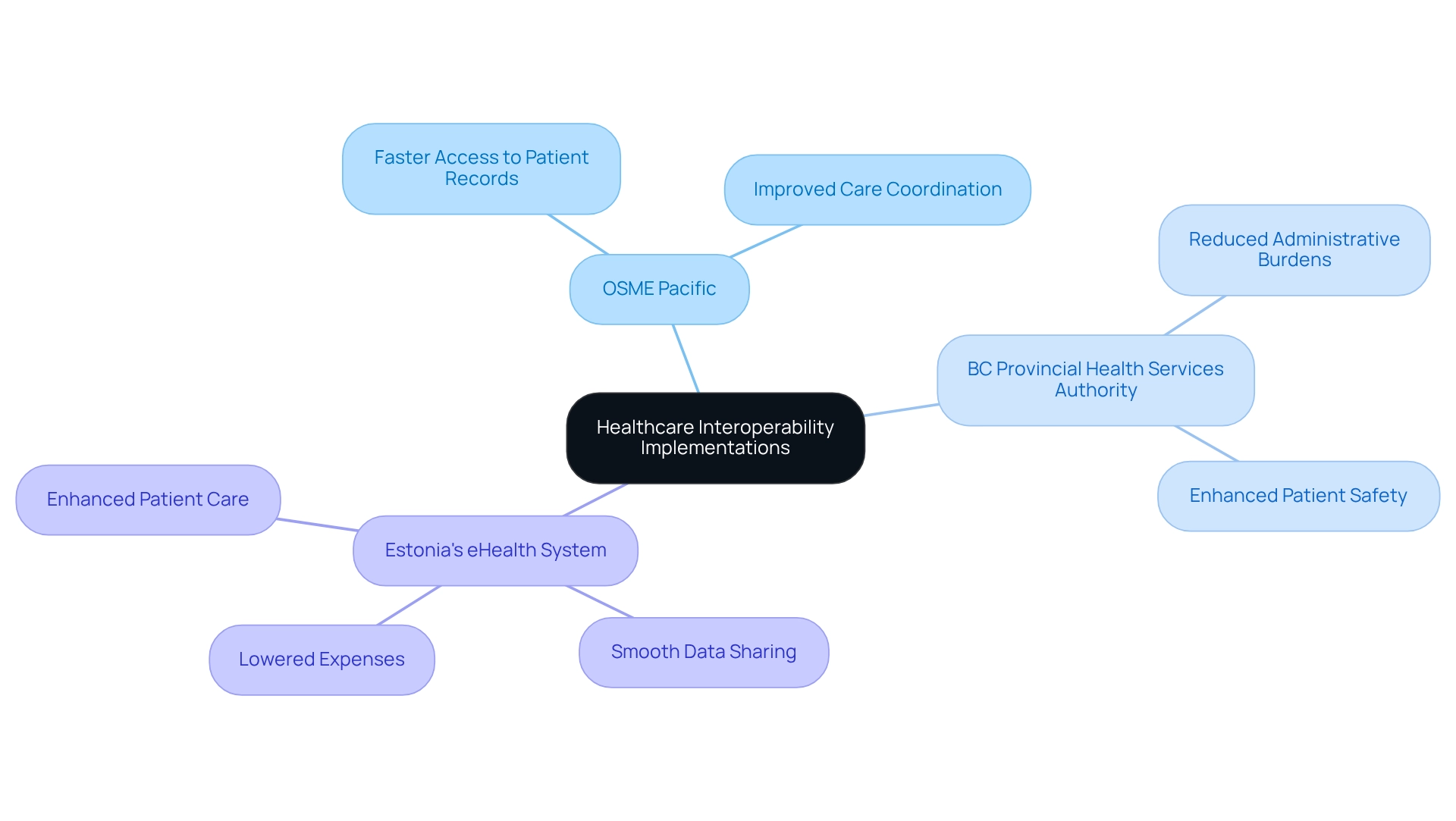Overview
Healthcare interoperability is not just a technical requirement; it is a fundamental necessity for enhancing patient care and operational efficiency. We recognize that challenges such as:
- Lack of standardization
- Data silos
- Cultural resistance
can significantly impede our progress in this area. However, by adopting standardized protocols and fostering cooperative alliances, we can dramatically improve information sharing and patient outcomes. What’s holding your team back from achieving this vital integration? Let us explore the solutions together and pave the way for a more connected healthcare environment.
Introduction
In the complex landscape of modern healthcare, we recognize that interoperability is a crucial pillar determining the efficiency and effectiveness of patient care. As various systems and devices strive to communicate seamlessly, the ability to share and access patient data emerges as a key factor in enhancing care coordination and improving outcomes.
However, what challenges are we facing on the journey toward achieving true interoperability?
- Data security concerns
- Regulatory hurdles
- A lack of standardization
present significant obstacles. This article delves into the significance of healthcare interoperability, explores the hurdles organizations encounter, and presents innovative solutions that can pave the way for a more connected healthcare ecosystem.
Through real-world case studies, we illuminate the transformative impact of strategic integration efforts, showcasing how we can harness technology to revolutionize patient data management and ultimately elevate the quality of care we deliver.
Define Healthcare Interoperability and Its Importance
The healthcare interoperability challenges emphasize the vital need for various systems, applications, and devices in the medical field to access, exchange, integrate, and collaboratively utilize information in a coordinated manner. This capability is essential for us to overcome healthcare interoperability challenges, ensuring that medical providers can share patient information efficiently, ultimately leading to improved care coordination and patient outcomes. Interoperability is crucial as it facilitates:
- Improved Patient Care: By permitting medical providers to access complete patient information, interoperability significantly reduces the likelihood of medical mistakes and unnecessary testing.
- Greater Efficiency: Simplified information sharing alleviates administrative burdens and helps overcome healthcare interoperability challenges, accelerating decision-making processes. The Hybrid Integration Platform streamlines intricate integrations, allowing entities to access information and systems swiftly, thereby enhancing operational effectiveness. As medical regulations evolve, healthcare interoperability challenges are addressed to assist entities in meeting compliance obligations by ensuring that information sharing practices align with legal standards. Our platform supports 12 levels of interface maturity and provides real-time monitoring and alerts on system performance, enabling a tailored approach that balances speed and sophistication in integration, ensuring compliance with changing standards. In summary, the healthcare interoperability challenges transcend mere technical necessity; they are a fundamental aspect of contemporary medical care that directly influences the quality of service we provide to patients. With our dedicated hybrid integration solutions, we empower medical organizations to enhance the value of their legacy systems while ensuring 24/7 uptime and reliability, ultimately transforming the way patient information is handled and utilized.

Identify Key Challenges to Healthcare Interoperability
Interoperability in medical environments presents undeniable advantages; however, healthcare interoperability challenges obstruct its effective implementation. The lack of standardization remains a significant hurdle, contributing to healthcare interoperability challenges, as disparate healthcare systems often utilize varying formats and protocols, complicating seamless information exchange. Our hybrid integration platform addresses this by employing standardized protocols, facilitating smoother information flow across systems.
-
Information Security and Privacy Issues are paramount; safeguarding sensitive patient details is crucial, and concerns about breaches can inhibit entities from sharing information freely. We prioritize secure technologies, ensuring that data sharing is both safe and compliant with regulations.
-
Healthcare interoperability challenges are created by fragmented systems and data silos, as numerous medical organizations operate with isolated systems that fail to interact, resulting in gaps in patient information. Our solutions unlock these isolated assets, fostering a more connected and efficient medical environment. A recent application at a local hospital demonstrated how our platform unified various systems, enhancing patient information accessibility.
-
Regulatory Hurdles complicate information sharing efforts, as entities must navigate intricate legal frameworks. Our expertise in integration assists organizations in optimizing compliance processes, facilitating responsible data sharing.
-
Cultural Resistance can arise from medical professionals accustomed to traditional workflows, creating hesitance to adopt new technologies. We promote a culture of teamwork among medical providers, encouraging the adoption of innovative solutions to address healthcare interoperability challenges.
Addressing these challenges requires a multifaceted strategy, including the implementation of standardized protocols, investment in secure technologies, and nurturing a culture of collaboration among medical providers. These elements are central to our mission at Avato, and we invite you to partner with us in overcoming these obstacles.

Explore Solutions to Enhance Healthcare Interoperability
To address healthcare interoperability challenges, we can adopt several effective strategies and technologies.
-
Implement Standardized Protocols: By utilizing widely accepted standards such as HL7 FHIR (Fast Healthcare Interoperability Resources), we address healthcare interoperability challenges and facilitate smoother information exchange between systems.
-
Utilize XSLT for Effective Information Transformation: Employing XSLT allows us to simplify XML information transformation processes, significantly decreasing the effort involved in creating transformative tasks. This not only enhances efficiency but also minimizes programming errors, leading to substantial cost savings in integration projects.
-
Invest in Interoperable Technologies: Investing in interoperable technologies is essential for overcoming healthcare interoperability challenges, as choosing platforms that prioritize interoperability and offer robust APIs (Application Programming Interfaces) helps bridge gaps between disparate systems.
-
Enhance Information Governance with Schemas: Establishing clear governance policies, supported by schemas, ensures that our sharing practices comply with regulations while maintaining patient privacy and security. Schemas can catch mistakes early in the coding process, further reducing errors and expenses associated with information management.
-
Foster Cooperative Alliances: Collaborating with other medical providers, technology suppliers, and regulatory agencies creates a more unified environment for information exchange.
-
Utilize Cloud-Based Solutions: Cloud technologies provide scalable and adaptable environments for data storage and sharing, facilitating easier integration of our systems and helping to overcome healthcare interoperability challenges.
By implementing these solutions, we can significantly enhance our interoperability capabilities, resulting in improved patient outcomes and operational efficiencies. Our expert integration services are designed to assist businesses in overcoming these challenges, ensuring a customer-centric approach to digital transformation.

Case Studies of Successful Healthcare Interoperability Implementations
We recognize that multiple healthcare entities have effectively adopted interoperability solutions, showcasing the significant advantages they offer. Consider OSME Pacific, which streamlined its data sharing processes through a hybrid integration platform. This enabled faster access to patient records and improved care coordination among providers. Similarly, the BC Provincial Health Services Authority leveraged standardized protocols to integrate its legacy systems with modern applications, ultimately reducing administrative burdens and enhancing patient safety. As Tony LeBlanc from the Provincial Health Services Authority noted, the team’s professionalism and knowledge have been essential in their integration efforts. Furthermore, Estonia’s eHealth System has established a national framework that facilitates smooth data sharing among various healthcare providers, greatly enhancing patient care while lowering expenses.
These case studies emphasize the importance of strategic planning, technology implementation, and collaboration in achieving effective healthcare interoperability. They demonstrate our role in streamlining complex integrations and providing economical solutions. What’s holding your team back from realizing similar advancements? To learn more about how we can support your organization, get your copy now and discover how our capabilities in delivering a connected foundation and supporting 12 levels of interface maturity can enhance your digital transformation initiatives.

Conclusion
Achieving true healthcare interoperability is not just beneficial; it is essential for enhancing patient care and operational efficiency within our sector. By clearly defining interoperability and acknowledging its significance, we underscore its critical role in improving care coordination, reducing medical errors, and ensuring regulatory compliance. However, we must confront several challenges, such as a lack of standardization, data security concerns, and cultural resistance, which continue to impede our progress in this vital area.
Fortunately, innovative solutions are at our disposal to help us overcome these obstacles. Implementing standardized protocols, leveraging advanced technologies, and fostering collaborative partnerships are essential strategies for enhancing interoperability. Real-world case studies, including those from OSME Pacific and Estonia’s eHealth system, illustrate the transformative potential of strategic integration efforts. These examples serve as a testament to how we can unlock the value of our data, streamline processes, and ultimately enhance patient outcomes.
In summary, the journey toward achieving seamless healthcare interoperability is both challenging and critical. By embracing modern integration solutions and fostering a culture of collaboration, we can pave the way for a more connected ecosystem that prioritizes patient care and operational excellence. The time to act is now; the benefits of interoperability extend far beyond mere technical capabilities, fundamentally transforming the quality of care we deliver to our patients.

